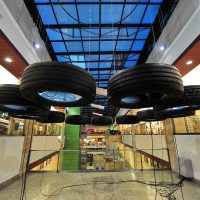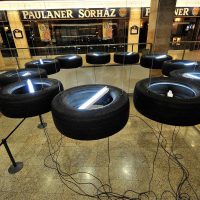Behind the “illusion” – the positive phenomena of “progress” – lurks the tension of the inability of motion, the forming of a hectic, frustrated state. The artist is interested in the major mechanisms working in the background of the actual political, social and economical issues. These mechanisms seem to globally penetrate all systems: Cseke’s mobile objects can be interpreted as models.
By their permanent motion, they perform a process in which the change of state is bare illusion and in the end it becomes monotony by the never ending repetition. Break out from this situation is impossible, the system cannot change its way of working. It is on a constraint path.
Szilárd Cseke’s mobile-s are minimal systems which are assembled from found objects. They have originally some kind of meaning defined by their industrial character and their existence as everyday tools of the consumer society.
Although in the exhibition space they become the elements of the artwork, and as they are reanimated by the artist, turning against their original, they obtain a new meaning, and they start to function as the criticism of the society which created them.

